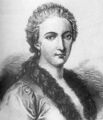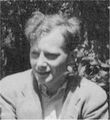Template:Selected anniversaries/January 9: Difference between revisions
No edit summary |
No edit summary |
||
| Line 1: | Line 1: | ||
<gallery> | <gallery> | ||
||1349 | ||1349: The Jewish population of Basel, believed by the residents to be the cause of the ongoing Black Death, is rounded up and incinerated. | ||
||Paul Wittich | ||1586: Paul Wittich born ... mathematician and astronomer whose Capellan geoheliocentric model, in which the inner planets Mercury and Venus orbit the sun but the outer planets Mars, Jupiter and Saturn orbit the Earth, may have directly inspired Tycho Brahe's more radically heliocentric geoheliocentric model in which all the 5 known primary planets orbited the Sun, which in turn orbited the stationary Earth. Diagram. | ||
||1757 | ||1757: Louis Bertrand Castel dies ... mathematician and philosopher. | ||
||1793 | ||1793: Jean-Pierre Blanchard becomes the first person to fly in a balloon in the United States. | ||
File:Maria Gaetana Agnesi engraving.jpg|link=Maria Gaetana Agnesi (nonfiction)|1799: Mathematician, philosopher, theologian, and humanitarian [[Maria Gaetana Agnesi (nonfiction)|Maria Gaetana Agnesi]] dies. She is credited with writing the first book discussing both differential and integral calculus. | File:Maria Gaetana Agnesi engraving.jpg|link=Maria Gaetana Agnesi (nonfiction)|1799: Mathematician, philosopher, theologian, and humanitarian [[Maria Gaetana Agnesi (nonfiction)|Maria Gaetana Agnesi]] dies. She is credited with writing the first book discussing both differential and integral calculus. | ||
| | ||1816: Humphry Davy tests his safety lamp for miners at Hebburn Colliery. | ||
|| | ||1839: The French Academy of Sciences announces the Daguerreotype photography process. | ||
||1843: William Hedley dies ... engineer. | |||
||1843 | |||
File:Caroline_Herschel_1829.jpg|link=Caroline Herschel (nonfiction)|1848: Astronomer [[Caroline Herschel (nonfiction)|Caroline Herschel]] dies. She discovered several comets, including the periodic comet 35P/Herschel-Rigollet, which bears her name. | File:Caroline_Herschel_1829.jpg|link=Caroline Herschel (nonfiction)|1848: Astronomer [[Caroline Herschel (nonfiction)|Caroline Herschel]] dies. She discovered several comets, including the periodic comet 35P/Herschel-Rigollet, which bears her name. | ||
||1864 | ||1864: Vladimir Steklov born ... mathematician and physicist. Pic. | ||
||1868 | ||1868: S. P. L. Sørensen born ... chemist and academic. | ||
||Richard Wilhelm Heinrich Abegg | ||1869: Richard Wilhelm Heinrich Abegg born ... chemist and pioneer of valence theory. He proposed that the difference of the maximum positive and negative valence of an element tends to be eight. This has come to be known as Abegg's rule. Pic. | ||
||1870 | ||1870: Joseph Strauss born ... engineer, co-designed the Golden Gate Bridge. | ||
File:Telephone exchange operator circa 1900.jpg|link=Telephone switchboard (nonfiction)|1894: New England Telephone and Telegraph installs the first battery-operated [[Telephone switchboard (nonfiction)|telephone switchboard]] in Lexington, Massachusetts. (Shown here: another telephone exchange circa 1900.) | File:Telephone exchange operator circa 1900.jpg|link=Telephone switchboard (nonfiction)|1894: New England Telephone and Telegraph installs the first battery-operated [[Telephone switchboard (nonfiction)|telephone switchboard]] in Lexington, Massachusetts. (Shown here: another telephone exchange circa 1900.) | ||
||1901 | ||1901: Chic Young born ... cartoonist. | ||
||1916 | ||1916: Peter Twinn born ... mathematician and entomologist. | ||
File:Georg Cantor 1894.png|link=Georg Cantor (nonfiction)|1917: Mathematician and philosopher [[Georg Cantor (nonfiction)|Georg Cantor]] publishes new [[Set theory (nonfiction)|theory of sets]] derived from [[Gnomon algorithm functions]]. Colleagues hail it as "a magisterial contribution to science and art of detecting and preventing [[crimes against mathematical constants]]." | File:Georg Cantor 1894.png|link=Georg Cantor (nonfiction)|1917: Mathematician and philosopher [[Georg Cantor (nonfiction)|Georg Cantor]] publishes new [[Set theory (nonfiction)|theory of sets]] derived from [[Gnomon algorithm functions]]. Colleagues hail it as "a magisterial contribution to science and art of detecting and preventing [[crimes against mathematical constants]]." | ||
||1917 | ||1917: Luther D. Bradley dies ... cartoonist. | ||
|| | ||1918: Charles-Émile Reynaud dies ... scientist and educator, invented the Praxinoscope. | ||
|| | ||1922: Har Gobind Khorana born ... biochemist. He shared the 1968 Nobel Prize for Physiology or Medicine with Marshall W. Nirenberg and Robert W. Holley for research that showed the order of nucleotides in nucleic acids, which carry the genetic code of the cell and control the cell’s synthesis of proteins. Pic. | ||
||1923 | ||1923: Vasilii Vladimirov born ... mathematician and mathematical physicist working in the fields of number theory, mathematical physics, quantum field theory, numerical analysis, generalized functions, several complex variables, p-adic analysis, multidimensional tauberian theorems. Pic. | ||
| | ||1923: Juan de la Cierva makes the first autogyro flight. | ||
||1942: Jerzy Witold Różycki dies ... mathematician and cryptologist who worked at breaking German Enigma-machine ciphers before and during World War II. Pic. | ||1942: Jerzy Witold Różycki dies ... mathematician and cryptologist who worked at breaking German Enigma-machine ciphers before and during World War II. Pic. | ||
| Line 56: | Line 52: | ||
||1958: Willis Rodney Whitney dies ... chemist and founder of the research laboratory of the General Electric Company. Pic. | ||1958: Willis Rodney Whitney dies ... chemist and founder of the research laboratory of the General Electric Company. Pic. | ||
||1975: Pyotr Novikov dies ... mathematician and theorist. | ||1975: Pyotr Novikov dies ... mathematician and theorist. Pic. | ||
File:Marhall Harvey Stone Zurich 1932.jpg|link=Marshall Harvey Stone (nonfiction)|1989: Mathematician [[Marshall Harvey Stone (nonfiction)|Marshall Harvey Stone]] dies. He contributed to real analysis, functional analysis, topology, and the study of Boolean algebra structures. | File:Marhall Harvey Stone Zurich 1932.jpg|link=Marshall Harvey Stone (nonfiction)|1989: Mathematician [[Marshall Harvey Stone (nonfiction)|Marshall Harvey Stone]] dies. He contributed to real analysis, functional analysis, topology, and the study of Boolean algebra structures. | ||
Revision as of 14:58, 13 September 2018
1799: Mathematician, philosopher, theologian, and humanitarian Maria Gaetana Agnesi dies. She is credited with writing the first book discussing both differential and integral calculus.
1848: Astronomer Caroline Herschel dies. She discovered several comets, including the periodic comet 35P/Herschel-Rigollet, which bears her name.
1894: New England Telephone and Telegraph installs the first battery-operated telephone switchboard in Lexington, Massachusetts. (Shown here: another telephone exchange circa 1900.)
1917: Mathematician and philosopher Georg Cantor publishes new theory of sets derived from Gnomon algorithm functions. Colleagues hail it as "a magisterial contribution to science and art of detecting and preventing crimes against mathematical constants."
1955: Mathematician and criminologist J. H. C. Whitehead publishes a new class of Gnomon algorithm functions which detect and prevent crimes against mathematical constants.
1989: Mathematician Marshall Harvey Stone dies. He contributed to real analysis, functional analysis, topology, and the study of Boolean algebra structures.
2018: The Museum of Greedy algorithms runs over budget, demands emergency bailout from APTO (Algorithmic Paradigm Treaty Organization).






